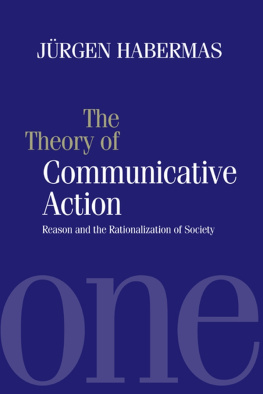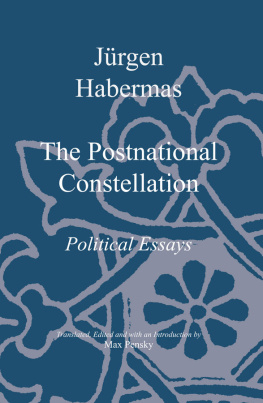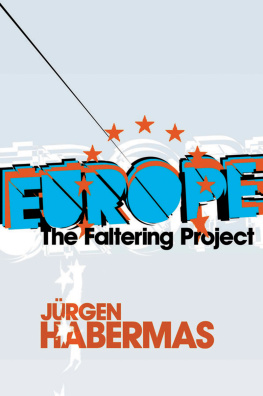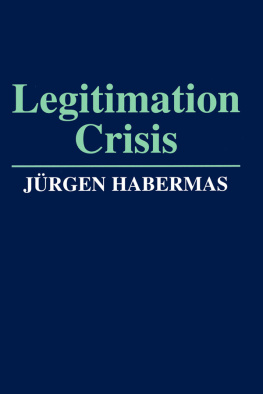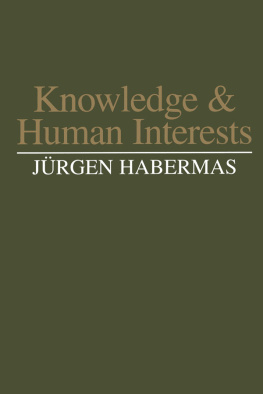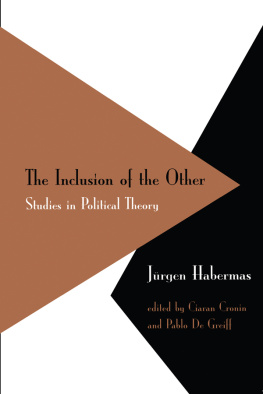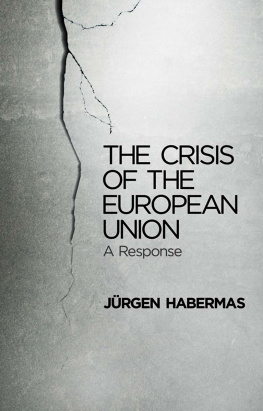
First published in German as Zeit der bergnge and
Suhrkamp Verlag Frankfurt am Main, 2001.
This English translation is Polity, 2006.
Chapter 12 first appeared in Religion and Rationality: Essays on Reason, God, and Modernity, by Jrgen Habermas and edited by Eduardo Mendieta, English translation Polity Press, 2002.
The right of Jrgen Habermas to be identified as Author of this Work has been asserted in accordance with the UK Copyright, Designs and Patents Act 1988.
First published by Polity in 2006.
Polity Press
65 Bridge Street
Cambridge CB2 1UR, UK.
Polity Press
350 Main Street
Malden, MA 02148, USA
All rights reserved. Except for the quotation of short passages for the purpose of criticism and review, no part of this publication may be reproduced, stored in a retrieval system, or transmitted, in any form or by any means, electronic, mechanical, photocopying, recording or otherwise, without the prior permission of the publisher.
ISBN: 0-7456-3010-3
ISBN: 0-7456-3011-1 (pb)
ISBN: 9780-7456-9410-8 (epub)
ISBN: 9780-7456-9317-0 (mobi)
A catalogue record for this book is available from the British Library.
For further information on Polity, visit our website: www.polity.co.uk
Editors' Preface
Time of Transitions, which bears the subtitle Short Political Writings IX in the German, is the ninth in a series of volumes devoted to the author's essays and interviews on current political events stretching back to the 1960s. This testifies to the remarkable span of time during which the German-reading public could count on one thing: no matter how tempestuous and unpredictable the course of German politics, no matter how deep or frequent the debate, controversy, or crisis, an essay by Jrgen Habermas would address it with a distinctive combination of analytical insight and political passion. For more than 40 years, from the earliest efforts at rebuilding a democratic culture out of the rubble of totalitarianism, through Germany's struggle with its identity as it re-emerged as a major economic and political power, to the politics of unification and the united Germany's role as an influential global political actor, Habermas's status as an indispensable voice in the German public sphere has remained one of the rare constants.
The present volume differs from other recent collections of his political writings, such as The Inclusion of the Other or The Postnational Constellation, in blending essays and interviews on contemporary German politics and society with more wide-ranging studies. An important source of thematic unity is, as the title implies, a concern with processes of transition that have shaped or are currently shaping the course of European and world history. The transition which provides the context for all of the others discussed is the process of social modernization which has penetrated and transformed every aspect of life in Western societies while extending inexorably to ever-further reaches of the globe. Habermas's social and political thought has been devoted to the theoretical understanding of this process and to the articulation of its rational moments on which more just and humane conditions of social life could be founded. In this, he has shown particular sensitivity to the pathologies of modernization, its capacity to destroy the cultural resources necessary for a human existence worthy of the name, and its extraordinary potential for violence, injustice, and inhumanity as witnessed by the history of the twentieth century.
A more restricted historical context for the essays is provided by the process of globalization and the resulting need for a transition from the classical international order of sovereign nation-states to a transnational political order, which Habermas argues should take the form of a global domestic politics without a world government. A still more narrowly circumscribed context is the transition toward greater political integration within an expanding European Union, a process wth important implications for political developments at the global level. And, finally, there are the longer- and shorter-term transitions of the Federal Republic of Germany which have been the focus of some of Habermas's most impassioned political interventions: the still incomplete postwar transition from the barbarity of the Nazi period to a functioning constitutional democracy, a learning process marked by denials and regressions, but also by notable, if painfully won, achievements; the post-1989 transition from a divided to a reunited Germany and the challenge of forging a democratic collective identity under the ambivalent aegis of a Berlin Republic; and the transition just begun from a necessarily restrictive understanding of Germany's role in European and world politics to the more expansive role demanded by its economic strength, its importance for European political integration, and its proximity to actual and potential crisis zones in Eastern Europe.
A major question posed by all of these transitions for Habermas is the extent to which the autonomous political practice of demo-cratic citizens, rather than the logic of supposedly impersonal economic forces, will determine the course they take. The urgency of the associated challenges can be seen from the fact that, unless modes of democratic political organization and legitimation emerge above the level of nation-states, market-driven globalization threatens to undermine social solidarity within constitutional democracies and to aggravate global injustice and insecurity, not to mention environmental destruction and climate change.
The immediate occasion for the interview which opens the collection was a transition within the transition from Bonn to the Berlin Republic, namely, the 1998 election victory of the Red-Green coalition of the Social Democrats and the Greens under Gerhard Schrder and Joschka Fischer, following 16 years of center-right governments under Helmut Kohl. Habermas does not disguise his dismay at the climate of political, economic, and cultural stagnation which gripped the country as the euphoria of the reunification process subsided and which he (rightly!) feared the new government would do little to alter. A major cause of the malaise, he thinks, is the failure to grasp the global dimension of the political challenges facing the country most ominously, mass unemployment and the illusion that effective social and economic reforms can still be undertaken at the national level. Yet he refuses to accept that there are no alternatives to a supine politics that merely reacts to the pressures of globalizing markets and thereby consents to its own increasing irrelevance. The alternative he proposes is a politics that responds in a self-critical, reflexive fashion to the growing restrictions on the room for maneuver of the nation-state. This would involve cooperating in the construction of transnational and supranational political institutions and fostering the cultural resources for a transnational public sphere through which the decisions and policies of these institutions could acquire democratic legitimacy. On this analysis, the challenge is to continue the project of constitutional democracy beyond the nation-state with the goal of securing the fragile bases of social solidarity painfully won by the welfare state and promoting democracy and social justice in other regions of the world.
In addition to his advocacy of a postnational renewal of the project of constitutional democracy, Habermas here strikes a number of chords that resonate throughout the collection. For example, his suspicion of Schrder's attempts to disguise the poverty of genuine political initiatives through a cultural politics of national symbols, for which the move of the capital from Bonn to Berlin provided ample opportunity, reflects an awareness of the enduring importance of public symbols for forging a collective identity and a shared political culture in constitutional democracies. This is all the more true in the case of Germany, where the public representation and interpretation of symbols of national identity, and especially those associated with the former imperial capital Berlin, is inextricably bound up with the process of coming to terms with the Nazi past.
Next page

